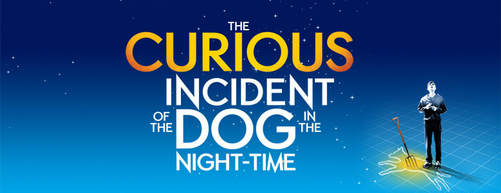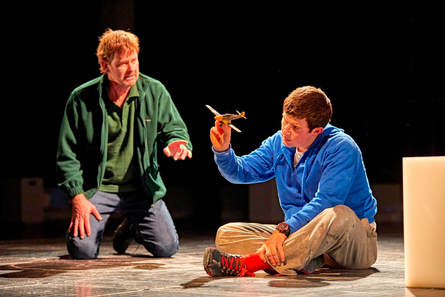The Curious Incident of the Dog in the Night-Time
Cliffs Pavilion, Southend on Sea
18th - 22nd July 2017
Cliffs Pavilion, Southend on Sea
18th - 22nd July 2017
The Curious Incident of the Dog in the Night-Time has been adapted for stage by Simon Stephens, a playwright actually known more for his rather dark and violent plays such as Punk Rock and Motortown. He wrote it, firstly because Mark Haddon, the writer of the original novel, asked him to and also because he wanted his two youngest children to be able to see his work. To Stephens' relief, all three were thrilled with the resulting production and so, it would appear, have been the ensuing audiences who have kept this play running since its debut at The National Theatre in London, on to its transfer to The Apollo in the West End and now with its current touring production across the UK.
The play is centred on Christopher, a 15 year old who has Asperger Syndrome, however, this is not a phrase that is mentioned in the play or, indeed, the novel. Instead, we are given a vision of the world from Christopher's view point as a boy who isn't defined by a 'label' but who struggles with day to day life from a social perspective. He has 'behavioural problems' and finds people difficult to engage with. He has never even left his street unaccompanied, yet has an exceptional mind which enables him to see the truths about our world that we have probably never noticed ourselves before. Christopher has a very logical mindset and is the first person at his special school to take maths A Level. So, when a neighbour's dog is killed, Christopher decides to set off on a journey to find out who the murderer is and ends up discovering a lot more besides. These skills aid him in his quest to try and be a detective and solve the crime.
Ultimately, this play is about a family trying to cope with the pressures of looking after Christopher and despite the tragedy of this situation, there is a lot of humour injected into the play. We laugh because Christopher's literal mind makes us realise how absurd some of our everyday language can be interpreted by someone like him: in one instance a policeman tells him to sit down, saying, "just park yourself down there" - to which Christopher acts out reversing and parking himself to the train seat, complete with handbrake!
Scott Reid is absolutely outstanding as Christopher. His performance is exhilaratingly endearing but shows a character who is also heartbreaking in his vulnerability. It is a wonderful feat of physically and mentally encompassing a role and bringing the believability factor of that character to the stage. There is a huge amount of physicality in this play, not only from Scott but the other nine actors, who all take on multiple roles. There are some lovely performances from Lucianne McEvoy as Christopher's teacher Siobhan and also David Michaels and Emma Beattie and Ed and Judy, Christopher's warring parents.
There are some significant moments where, through the use of physical theatre, we see Christopher's imagination come to life as he dreams of being an astronaut and floats across the stage; and again, where his mind is completely overwhelmed whilst waiting for a tube train at Paddington.
This truly is an inspiring piece of theatre and the mathematical grid box set itself, designed by Bunny Christie, in all its technological wonder, should be credited as the eleventh member of the cast, along with the touring techies, Chris Payne and Adam Thomas Steer who manage to execute 234 sound cues, control 892 pixel LEDs in the lighting dots on the floor as well as the eight projectors in the lighting and video rig. What is important to note though, is that despite the weight of this technology, the play and the performers are never upstaged by it.
Booming sound effects and edgy music bytes help to keep the pace of the show going and you almost don't want it to end. In fact, don't rush off too quickly after the bows.
The Curious Incident of the Dog in the Night-Time will hopefully clarify people's perceptions of what someone like Christopher has to go through just to get by on a day to day basis. It is a without doubt a triumph of modern theatre and will hopefully prove as successful throughout its forthcoming international tour as it has on the UK one. Don't miss it!
The play is centred on Christopher, a 15 year old who has Asperger Syndrome, however, this is not a phrase that is mentioned in the play or, indeed, the novel. Instead, we are given a vision of the world from Christopher's view point as a boy who isn't defined by a 'label' but who struggles with day to day life from a social perspective. He has 'behavioural problems' and finds people difficult to engage with. He has never even left his street unaccompanied, yet has an exceptional mind which enables him to see the truths about our world that we have probably never noticed ourselves before. Christopher has a very logical mindset and is the first person at his special school to take maths A Level. So, when a neighbour's dog is killed, Christopher decides to set off on a journey to find out who the murderer is and ends up discovering a lot more besides. These skills aid him in his quest to try and be a detective and solve the crime.
Ultimately, this play is about a family trying to cope with the pressures of looking after Christopher and despite the tragedy of this situation, there is a lot of humour injected into the play. We laugh because Christopher's literal mind makes us realise how absurd some of our everyday language can be interpreted by someone like him: in one instance a policeman tells him to sit down, saying, "just park yourself down there" - to which Christopher acts out reversing and parking himself to the train seat, complete with handbrake!
Scott Reid is absolutely outstanding as Christopher. His performance is exhilaratingly endearing but shows a character who is also heartbreaking in his vulnerability. It is a wonderful feat of physically and mentally encompassing a role and bringing the believability factor of that character to the stage. There is a huge amount of physicality in this play, not only from Scott but the other nine actors, who all take on multiple roles. There are some lovely performances from Lucianne McEvoy as Christopher's teacher Siobhan and also David Michaels and Emma Beattie and Ed and Judy, Christopher's warring parents.
There are some significant moments where, through the use of physical theatre, we see Christopher's imagination come to life as he dreams of being an astronaut and floats across the stage; and again, where his mind is completely overwhelmed whilst waiting for a tube train at Paddington.
This truly is an inspiring piece of theatre and the mathematical grid box set itself, designed by Bunny Christie, in all its technological wonder, should be credited as the eleventh member of the cast, along with the touring techies, Chris Payne and Adam Thomas Steer who manage to execute 234 sound cues, control 892 pixel LEDs in the lighting dots on the floor as well as the eight projectors in the lighting and video rig. What is important to note though, is that despite the weight of this technology, the play and the performers are never upstaged by it.
Booming sound effects and edgy music bytes help to keep the pace of the show going and you almost don't want it to end. In fact, don't rush off too quickly after the bows.
The Curious Incident of the Dog in the Night-Time will hopefully clarify people's perceptions of what someone like Christopher has to go through just to get by on a day to day basis. It is a without doubt a triumph of modern theatre and will hopefully prove as successful throughout its forthcoming international tour as it has on the UK one. Don't miss it!
Tickets available from www.southendtheatres.org.uk or call the box office on 01702 351135

